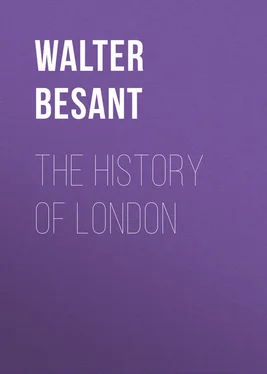Walter Besant - The History of London
Здесь есть возможность читать онлайн «Walter Besant - The History of London» — ознакомительный отрывок электронной книги совершенно бесплатно, а после прочтения отрывка купить полную версию. В некоторых случаях можно слушать аудио, скачать через торрент в формате fb2 и присутствует краткое содержание. Жанр: foreign_antique, foreign_prose, Историческая проза, на английском языке. Описание произведения, (предисловие) а так же отзывы посетителей доступны на портале библиотеки ЛибКат.
- Название:The History of London
- Автор:
- Жанр:
- Год:неизвестен
- ISBN:нет данных
- Рейтинг книги:5 / 5. Голосов: 1
-
Избранное:Добавить в избранное
- Отзывы:
-
Ваша оценка:
- 100
- 1
- 2
- 3
- 4
- 5
The History of London: краткое содержание, описание и аннотация
Предлагаем к чтению аннотацию, описание, краткое содержание или предисловие (зависит от того, что написал сам автор книги «The History of London»). Если вы не нашли необходимую информацию о книге — напишите в комментариях, мы постараемся отыскать её.
The History of London — читать онлайн ознакомительный отрывок
Ниже представлен текст книги, разбитый по страницам. Система сохранения места последней прочитанной страницы, позволяет с удобством читать онлайн бесплатно книгу «The History of London», без необходимости каждый раз заново искать на чём Вы остановились. Поставьте закладку, и сможете в любой момент перейти на страницу, на которой закончили чтение.
Интервал:
Закладка:
Meanwhile the roofs of the villas and churches fell in, the walls decayed, the gardens were overgrown. Augusta – the proud and stately Augusta – was reduced to a wall enclosing a heap of ruins with a few savages huddled together in hovels by the riverside.
For the East Saxon had overrun Essex, the Jute covered Kent and Surrey, the South Saxon held Sussex, the West Saxon held Wessex. All around – on every side – London was surrounded by the Conqueror of the Land. Why, then, did they not take London? Because London was deserted; there was nothing to take: London was silent. No ships going up or down the river reminded the Saxon of the City. It lay amid its marshes and its moors, the old roads choked and overgrown; it was forgotten; it was what the Saxons had already made of Canterbury and Anderida, a 'Waste Chester,' that is, a desolated stronghold.
Augusta was forgotten.
This is the story that we learn from the actual site of London – its position among marshes, the conditions under which alone the people could be maintained.
How long did this oblivion continue? No one knows when it began or when it ended. As I read the story of the past, I find a day towards the close of the sixth century when there appeared within sight of the deserted walls a company of East Saxons. They were hunting: they were armed with spears: they followed the chase through the great forest afterwards called the Middlesex Forest, Epping Forest, Hainault Forest, and across the marshes of the river Lea, full of sedge and reed and treacherous quagmires. And they saw before them the gray walls of a great city of which they had never heard.
They advanced cautiously: they found themselves on a firm road, the Vicinal Way, covered with grass: they expected the sight of an enemy on the wall: none appeared. The gates were closed, the timbers were rotten and fell down at a touch: the men broke through and found themselves among the streets of a city all in ruins. They ran about – shouting – no one appeared: the City was deserted.
They went away and told what they had found.
But Augusta had perished. When the City appears again it is under its more ancient name – it is again London.
8. THE FIRST SAXON SETTLEMENT
A hundred and fifty years passed away between the landing of the East Saxons and their recorded occupation of the City. This long period made a great difference in the fierce savage who followed the standard of the White Horse and landed on the coast of Essex. He became more peaceful: he settled down contentedly to periods of tranquillity. Certain arts he acquired, and he learned to live in towns: as yet he was not a Christian. This means that the influence of Rome with its religion, its learning and its arts had not yet touched him.
But he had begun to live in towns; and he lived in London.
Perhaps the first of the new settlers were the foreign merchants returning, as soon as more settled times allowed, with their cargoes. London has always been a place of trade. But for trade no one would have settled in it. Therefore, either the men of Essex invited the foreign merchants to return; or the foreign merchants returned and invited the men of Essex to come into the City and to bring with them what they had to exchange.
In the year 597 Augustine, prior of a Roman monastery, was sent by Pope Gregory the Great with forty monks, to convert the English. Ethelbert, King of Kent, and most powerful of the English kinglets, was married to Bertha, a Christian princess. She had brought with her a chaplain and it was probably at her invitation or through her influence, that the monks were sent. They landed at Thanet. They obtained permission to meet the King in the open air. They appeared wearing their robes, carrying a crucifix, and chanting Psalms. It is probable that the conversion of the King had been arranged beforehand; for without any difficulty or delay the King and all his Court, and, following the King's example, all the people were baptised.
Augustine returned to Rome where he was consecrated Archbishop of the English nation. A church was built at Canterbury, and the work of preaching the Faith went on vigorously. The East Saxons made no more hesitation at being baptised than the men of Kent. Ethelbert, indeed, could command obedience; he was Over Lord of all the nations south of the Humber. He it was, according to Bede, who built the first church of St. Paul in London, a fact which proves his authority and influence in London, and his sincere desire that the East Saxons should become Christians.
They did, in a way. But when King Siebehrt died, they relapsed and drove their Bishop into exile.
Then – Bede says that they were punished for this sin – the East Saxons fell into trouble. They went to war with the men of Wessex and were defeated by them. After this, we find London in the hands of the Northumbrians and the Mercians – that is to say – these nations one after the other obtained the supremacy. It was in the year 616 or thereabouts, that Bishop Mellitus had to leave his diocese. Forty years later another conversion of London took place under Bishop Cedd, consecrated at Lindisfarne. The new faith was not strong enough to stand against a plague, and the East Saxons of London went back once more to their old gods. After another thirty years, before the close of the seventh century, London was again converted: and this time for good.
In the eighth century London passed again out of the hands of the East Saxon kings into those of the Mercians. The earliest extant document concerning London is one dated 734, in which King Ethelbald grants to the Bishop of Rochester leave to send one ship without tax in or out of London Port.
A witan – i.e. a national council – was held in London in 811. It is then spoken of as an illustrious place and royal city. The supremacy of Mercia passed to that of Wessex – London went with the supremacy. In 833 Egbert, King of Wessex, held a witan in London.
When Egbert died the supremacy of Wessex fell with him. Then the Danish troubles fell thick and disastrous upon the country. When Alfred succeeded to the Crown the Danes held the Isle of Thanet, which commanded the river; they had conquered the north country from the Tweed to the Humber; they had overrun all the eastern counties twice – viz., in 839 and in 852: they had pillaged London, which they presently occupied, making it their headquarters. With this Danish occupation ends the first Saxon settlement of the City.
9. THE SECOND SAXON SETTLEMENT
The Danes held the City for twelve years at least. One cannot believe that these fierce warriors, who were exactly what the Saxons and Jutes had been four hundred years before – as fierce, as rude, as pagan – suffered any of the inhabitants, except the slaves, to remain. Massacre and pillage – or the fear of both – drove away all the residents. But the City was the headquarters of the Danes. Alfred recovered it in the year 884.
He found it as the East Saxons had found it three hundred years before, a city of ruins; the wall a ruin; the churches destroyed.
King Alfred has left many imperishable monuments of his reign. One of the greatest is the City of London, which he rebuilt. A recent historian (Loftie, Historic Towns , 'London') says that it would hardly be wrong to write, 'London was founded, rather more than a thousand years ago, by King Alfred – who chose for the site of his city a place formerly fortified by the Romans but desolated successively by the Saxons and the Danes.'
The first thing he did was to rebuild the wall. This work re-established confidence in the minds of the citizens. Alfred placed his son-in-law Ethelred, afterwards Alderman (i.e. Chief man – Governor) of the Mercians, in command of the City, which seems to have been immediately filled with people. The London citizens went out with Ethelred to defeat the Danes at Benfleet, and with Alfred to defeat the Danes at the mouth of the river Lea; they went out with Athelstan to fight at Brunanburgh. London was never again taken by the Danes. Twice Sweyn endeavoured to take the City but was repulsed. Nor did London open her gates to him until the King had left the City. And when the Danes again entered the City there was no more pillage or massacre; London was too strong to be pillaged or massacred, and too rich to be abandoned to the army.
Читать дальшеИнтервал:
Закладка:
Похожие книги на «The History of London»
Представляем Вашему вниманию похожие книги на «The History of London» списком для выбора. Мы отобрали схожую по названию и смыслу литературу в надежде предоставить читателям больше вариантов отыскать новые, интересные, ещё непрочитанные произведения.
Обсуждение, отзывы о книге «The History of London» и просто собственные мнения читателей. Оставьте ваши комментарии, напишите, что Вы думаете о произведении, его смысле или главных героях. Укажите что конкретно понравилось, а что нет, и почему Вы так считаете.












